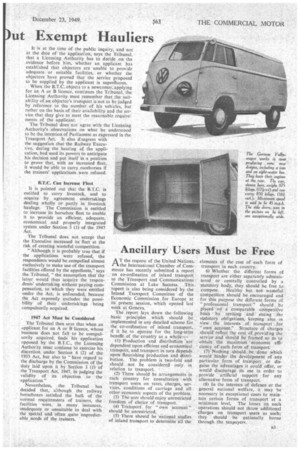Ancillary Users Must be Free
Page 37

If you've noticed an error in this article please click here to report it so we can fix it.
AT the request of the United Nations, the International Chamber of Commerce has recently submitted a report on co-ordination of inland transport to the Transport and Communications Commission at Lake Success. This report is also being considered by the Inland Transport Committee of the Economic Commission for Europe at its present session, which opened last week at Geneva.
The report lays down the following basic principles . which should be • implemented in any detailed scheme for the co-ordination of inland transport, if it be to operate for the long-term . benefit of the country as a whole:—
(1) Production and distribotion are dependent upon efficient and economical transport, and transport in turn depends upon flourishing production and distribution. The problem is two-fold and should not be considered only in relation to transport.
(2) There should be arrangements in each country for consultation • with transport users on rates, charges, services, conditions of carriage and all other economic aspects of the problem. (3) The user should enjoy unrestricted freedom of choice of transport.
(4) Transport for "own account" should be unrestricted.
(5) There should be national studies of inland transport to determine all the elements of the cost of each form of transport in each country.
6) Whether the different forms of transport are either separately administered or centrally controlled by a statutory body, they should be free to compete. Healthy but not wasteful competition should be encouraged and for this purpose the different forms of "professional transport" should be . placed on a comparable competitive basis by revising anti-' easing the statutory obligations, keeping also in view the interests of transport for "own account." Structure of charges sheuld reflect the cost of providing the service and should be framed so as to obtain the maximum economic efficiency of each form of transport.
(7) Nothing should be done which would hinder the development of any particular form of transport . or disguise the advantages it could offer, or would discourage its use in order to provide artificial support for any alternative form of transport.
(8) In the interests of defence or the general national welfare, it may be necessary in exceptional cases to maintain certain forms of transport at a minimum level. The losses on such operations should not throw additional charges on transport users as such; they should be nationally borne through the taxpayers.




















































































